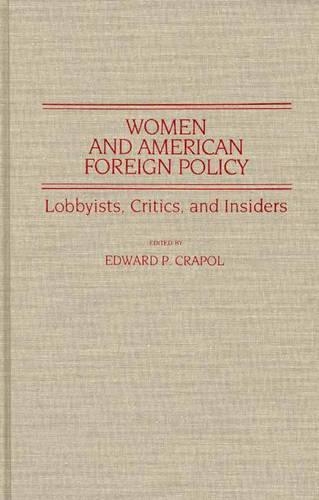
Women and American Foreign Policy: Lobbyists, Critics, and Insiders
(Hardback)
Publishing Details
Women and American Foreign Policy: Lobbyists, Critics, and Insiders
By (Author) Edward P. Crapol
Bloomsbury Publishing PLC
Praeger Publishers Inc
3rd April 1987
United States
Classifications
Tertiary Education
Non Fiction
327.73
Physical Properties
Hardback
213
Width 156mm, Height 235mm
510g
Description
In recent years, despite widespread interest in feminism, women's studies, and socio-historical perspectives in general, scholars have failed to unearth a body of historical knowledge related to women in the area of American foreign policymaking--until now. This unique volume brings to light the experiences of eight courageous women, who over a century and a half, had a concrete influence in this area. From Abolitionist critic Lydia Maria Child, to former United States Ambassador to the United Nations Jeane Kirkpatrick, a number of American women have attempted to shape and define the nation's foreign policy, admittedly with varying, often limited degrees of success. In doing so, however, they expanded women's role in the public eye, helped shape public consciousness about the nation's diplomacy, and frequently offered alternative policies that ultimately infiltrated the inner sanctum of the foreign policy establishment.
Reviews
The editor took the idea for this book from his course in the history of American foreign policy in which he was challenged by women students concerning the role of women. His initial response, that there has been no meaningful role, is qualified by the book. Its eight essays cover about a century and a half, beginning with abolitionist Lydia Maria Child and continuing with Jane M. Cazneau, Anna Ella Carroll, Lucia True Ames Meade, Eleanor Roosevelt, Eleanor Lansing Dulles, Jane Fonda, Jeane Kirkpatrick, and a final essay concerning women in the State Department. He observes that the formulation and conduct of US diplomacy has been and remains dominated by men, but that since 1830 women have attempted to shape and influence the policy and have met with some success. He believes women have expanded their role, helped shape the public consciousness, and offered alternatives that have influenced policy decisions without ever being part of the policy-making elite itself. The essays are short, and well documented. This book fills a gap in the literature of women in politics in that it addresses the influence of women on US foreign policy. Bibliography and index. Essential for political science and women's studies libraries.-Choice
This innovative collection of essays explores the questions of whether women have influenced thought and practice in American foreign policy, and, whether the women studied brought a uniquely female perspective to their efforts. The eight essays on individual women, as well as the concluding overview, examine the ways in which women participated in shaping foreign policy from the years before the Civil War to contemporary society. The women studied range from the famous (Lydia Maria Child, Jeannette Rankin, Eleanor Roosevelt, Jane Fonda, Jeane Kirkpatrick) to the relatively obscure (Lucie True Ames Mead, Jane M. Cazneau, Anna Ella Caroll, Eleanor Lansing Dulles); they also represent diverse experiences in addressing the major issues of the day, their political perspectives, and their organizational affiliations. This ambitious project provides documentation of a previously unexplored area of history, and is bound to generate additional research in years to come.-Women's Studies International Forum
"This innovative collection of essays explores the questions of whether women have influenced thought and practice in American foreign policy, and, whether the women studied brought a uniquely female perspective to their efforts. The eight essays on individual women, as well as the concluding overview, examine the ways in which women participated in shaping foreign policy from the years before the Civil War to contemporary society. The women studied range from the famous (Lydia Maria Child, Jeannette Rankin, Eleanor Roosevelt, Jane Fonda, Jeane Kirkpatrick) to the relatively obscure (Lucie True Ames Mead, Jane M. Cazneau, Anna Ella Caroll, Eleanor Lansing Dulles); they also represent diverse experiences in addressing the major issues of the day, their political perspectives, and their organizational affiliations. This ambitious project provides documentation of a previously unexplored area of history, and is bound to generate additional research in years to come."-Women's Studies International Forum
"The editor took the idea for this book from his course in the history of American foreign policy in which he was challenged by women students concerning the role of women. His initial response, that there has been no meaningful role, is qualified by the book. Its eight essays cover about a century and a half, beginning with abolitionist Lydia Maria Child and continuing with Jane M. Cazneau, Anna Ella Carroll, Lucia True Ames Meade, Eleanor Roosevelt, Eleanor Lansing Dulles, Jane Fonda, Jeane Kirkpatrick, and a final essay concerning women in the State Department. He observes that the formulation and conduct of US diplomacy has been and remains dominated by men, but that since 1830 women have attempted to shape and influence the policy and have met with some success. He believes women have expanded their role, helped shape the public consciousness, and offered alternatives that have influenced policy decisions without ever being part of the policy-making elite itself. The essays are short, and well documented. This book fills a gap in the literature of women in politics in that it addresses the influence of women on US foreign policy. Bibliography and index. Essential for political science and women's studies libraries."-Choice
Author Bio
EDWARD P. CRAPOL is Professor and Chairman of the Department of History at the College of William and Mary in Virginia.
